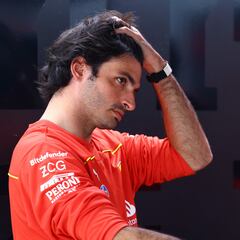What does Fernando Alonso think of the F1 2026 regulations as he waits for the Spanish GP?
Fernando Alonso spoke with AS at an Aramco-organized event before the Spanish Grand Prix this weekend.

At an Aramco-organized event before the Spanish GP this weekend, Fernando Alonso took the time to speak with AS on his circuit of La Morgal, in a space full of karts, while several students tour the facilities and the museum.
The two-time champion answered questions about his future with Aston Martin, his views on the current F1 market and the coming 2026 regulations.
What does Fernando Alonso think of the 2026 F1 regulations
When you last renewed, you said the Formula 1 atmosphere wasn’t really your place, because of that excess of luxury and everything around racing. Here you are at home.
Yes, this is more in line with what I experienced when I grew up. I love motorsport, but without the excesses of Formula 1. It doesn’t mean I don’t take advantage of them and I don’t live a comfortable life, and that I do what I like, that is to race on the biggest stage of racing, and that I enjoy what happens there. But it’s good to disconnect and see the dirt, to smell the gasoline. It’s reassuring.
“What does Karting bring to you?” It’s pure automobile, no wrapping.
It allows me to stay in shape and keep my reflexes awake. Movements in a karting are more abrupt, everything is more direct for the driver, the sensations and senses of driving feel awaken. Besides, I get to come to Asturias and see my friends and my family. It resets me after living in a bubble for three months of traveling between China, Japan, Miami, airports, five-star hotels, travel... everything that is the F1. Then I come here to Asturias, to be with family, and reset on the real true values of life.

When you work with children at a campus, how do you explain to the kids that the exceptional thing in a driver’s career is to win? That the normal thing in elite sport is to lose?
One of the biggest challenges we face is getting this concept across to students on campus and the parents who visit the circuit. Sports in general are more about failing than winning. A football player plays thousands of matches and will be lucky if he wins half of those, but a driver runs hundreds of races to win five or six. And this, when you are a child or when you are a parent and your child is in karting, is very difficult to convey because there is excessive excitement. With the right words, you try to convey that message. Racing has to be a hobby, like when you go to play padel, tennis, or football on weekends. Let the pressure come later, not when they are a child.
How many brilliant races go unnoticed because you’re fighting for a seventh or eighth place?
Many. In a year, out of 24 races, six are done almost to perfection. Out of those six, five go unnoticed by the general public because you don‘t make it to the podium and you are not on TV. On the other hand, there are times when you have the right car and you’re always on the podium or in the spotlight, and you’re praised for races that had three or four mistakes that went unnoticed. You reap the rewards when you don’t deserve them, and you don’t reap them when you do deserve them.
When you left F1 in 2018, or even when you came back in 2021, did you expect to have such a prolonged second go at it, or at least until 2026?
No, for sure not. When I came back with Alpine I thought I would do those two years, wait for the regulations that came in effect in 2022 and see how things were going. In the end I’m going to end up taking the 2026 regulations. Of course I didn’t expect it. But it’s difficult to plan a career in sports and especially in racing, where you depend so much on the vehicle. I found myself doing very well in 2021 and 2022, the expectation was to renew for 2023. That 2023 was exceptionally good and now in 2024 I’m still going strong and I’m feeling motivated, and I’m curious to try the 2026 cars. It wasn’t my plan when I came back to F1, if I don’t find myself 100% or so comfortable, Alpine would have been my last step.
How much does being in the fight to win a few races last year influence you to want to keep racing?
It does have an influence. When you don’t have the right tools, you’re at the back of the grid and things don’t go well, your motivation is never the same, no matter how competitive you are. Without results and incentives, it’s hard to maintain the same level of commitment and dedication. Last year’s podiums and the fight for victories resulted in me wanting to extend for two or three years my career.
The driver market has been interesting lately, with some good teams having open spots in their teams. Why have you been so sure about what you want to do and not been persuaded by team bosses who might have wanted to keep you as a backup option?
Making the right choice is always a challenge, and no one can predict the future, especially with the new regulations coming in 2026. I’ve been fortunate to have the freedom to make my own decisions throughout my career. The current driver market is unstable because drivers have limited control over their options, and teams are strategically maneuvering. The waiting period can be stressful for drivers, as they’re unsure about their future. I had the option to stay with Aston Martin, who were eager for me to continue. I explored other teams that could potentially offer a better package, but the prospects were uncertain or required a long wait. Ultimately, I decided to remain with Aston Martin, as they genuinely wanted to work with me.
In 2023, eight podiums. In 2024, the situation is different. Do you see progress at Aston Martin?
Yes, I do. Yes, I do see progress. The eight podiums we achieved last year were exceptional, especially considering we finished fifth in the constructors’ championship. That’s not something that happens often. In fact, it will be interesting to see how many drivers manage to get eight podiums this year with a car that’s only the second, third, or fourth best. It’s not easy to get eight podiums, let alone with the fifth-best car in the championship. But we’re going to keep trying. I don’t know if we’ll get eight again this year, but the season is long. We’ve learned a lot about the car that we need to put into practice. In F1, there are no quick fixes. It can take three weeks to design, manufacture, test, and implement a new part on the car. As a driver or a fan, you might not always understand that because you want things done yesterday.
How do you build a winning team in F1? Setting aside luck, what controllable elements or factors exist, and which ones are present at Aston Martin?
There’s a must need to invest. You need massive investment to have top-tier factories and tools. Then you need a workforce committed to the team, all rowing in the same direction. And then, as a group, when you have 1,000 people working in an organization, you need all of them in the right spot. Sometimes the defender is playing left winger and the striker is playing goalkeeper, and you realize it to late. Identifying the best potential among the thousand people we work with takes some time, which is why teams with great stability like Red Bull and Mercedes are teams with a great method that has a lot of work behind it.
If you were suddenly given a car capable of consistently winning races starting next year, or in 2026, do you have any doubts about your ability to perform at your best and extract the maximum potential from the car?
No.
Taking Verstappen’s level into account?
Verstappen would certainly be a tough competitor under those conditions. But I have a lot of confidence in myself as well. Verstappen has proven to be maybe the only driver to perform even when conditions are harsh, so he would be a tremendously difficult driver to beat. But I have confidence in myself.
There is a lot of discussion about the 2026 technical regulations. Would you like to see a shift in the sport to regulations that place a greater amount of responsibility on the driver?
Certainly, but that’s the nature of F1. What I would like to see is more freedom of design. All the cars today look very similar to each other. There is little inventiveness. When I was a kid, F1 cars were very different. One with a high nose, another with a low nose, another with six wheels. That creativity has been lost now and I would like to see it again.
Cars without radio...
They tried that years ago, taking away the radio on formation laps and giving the driver more autonomy. But we can see that in 2024, with the complexity of engines today, you can’t take away the radio because they are very complex vehicles even to start. There must be consistency in what is done. Like now, introducing in 2026 an engine that weighs 40 kilos more due to the extra batterie, and the bigger electric part, but at the same time they want to reduce the total weight of the cars; it’s all a bit incoherent.
Do the 2026 regulations draw your attention?
Not excessively. I don’t think they are a radical change. It will be marketed as such because F1 sells itself every four or five years as reinventing itself, but F1 remains very similar overall. However, it does attract other manufacturers like Audi; there was interest from other engine manufacturers due to commercial interests. But I don’t think the races, weekends, or car competitiveness will be revolutionized.
Related stories
We reach 2024. We come from four or five races that were more competitive. Not as competitive as in 2023, when you were right behind Red Bull. What do you think about the current competition and how do you think Aston Martin can progress towards the top 4?
Well it is a challenge. Last year, Red Bull was ahead and we had the chance for a podium spot by battling a weakened Ferrari and Mercedes, and McLaren going trough a progression. This year, if we want to make a big step in performance to compete for podiums, we have to surpass three teams that are at a high level. That’s what we’re up against. But more competition at the top is beneficial, and having more teams fighting for victory also benefits us because there will be more tension and activity among them, and hopefully, we can take advantage of the chaos.


Complete your personal details to comment